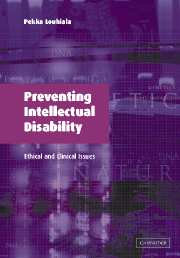Book contents
- Frontmatter
- Contents
- Acknowledgements
- 1 Introduction
- 2 On the definition of intellectual disability?
- 3 Epidemiology of intellectual disability
- 4 Prevention of intellectual disability: general issues
- 5 Prenatal diagnosis and screening
- 6 Genetic counselling
- 7 Why should intellectual disability be prevented?
- 8 Moral status and intellectual disability
- 9 The ethics of prevention in practice: three syndromes
- 10 Conclusion
- References
- Index
2 - On the definition of intellectual disability?
Published online by Cambridge University Press: 09 August 2009
- Frontmatter
- Contents
- Acknowledgements
- 1 Introduction
- 2 On the definition of intellectual disability?
- 3 Epidemiology of intellectual disability
- 4 Prevention of intellectual disability: general issues
- 5 Prenatal diagnosis and screening
- 6 Genetic counselling
- 7 Why should intellectual disability be prevented?
- 8 Moral status and intellectual disability
- 9 The ethics of prevention in practice: three syndromes
- 10 Conclusion
- References
- Index
Summary
Various terms referring to intellectual disability (ID) have been used, and they reflect both the times and the context of their use. In fact, it has been argued that the terms seem to have a ‘half-life’ of acceptability (Kopelman 1984). In their article on the definition and classification of mental retardation, Zigler et al. (1984, p. 215) stated that ‘without a clear and universally accepted definition of mental retardation, efforts to understand its nature and to improve the lives of retarded persons must be seriously compromised’. (I use the term ‘mental retardation’ when I refer specifically to, for example, articles or the American classification using the term.) While it is true that there is no general agreement on the definition, it is, however, not clear whether a single and universal definition is a preferable goal. The amount to which any solution would help improve the lives of the intellectually disabled is also questionable.
For example, the terms ‘moron’, ‘imbecile’ and ‘idiot’ were originally introduced as technical terms to cover the levels of ID. Table 2.1 lists some of the terms that have been used during recent years.
The problems of the definition of ID have been dealt with at length in some medical and psychological texts. On the contrary, philosophical texts that deal with ID present poor definitions or no definition at all (Boddington et al. 1991).
- Type
- Chapter
- Information
- Preventing Intellectual DisabilityEthical and Clinical Issues, pp. 8 - 22Publisher: Cambridge University PressPrint publication year: 2003



